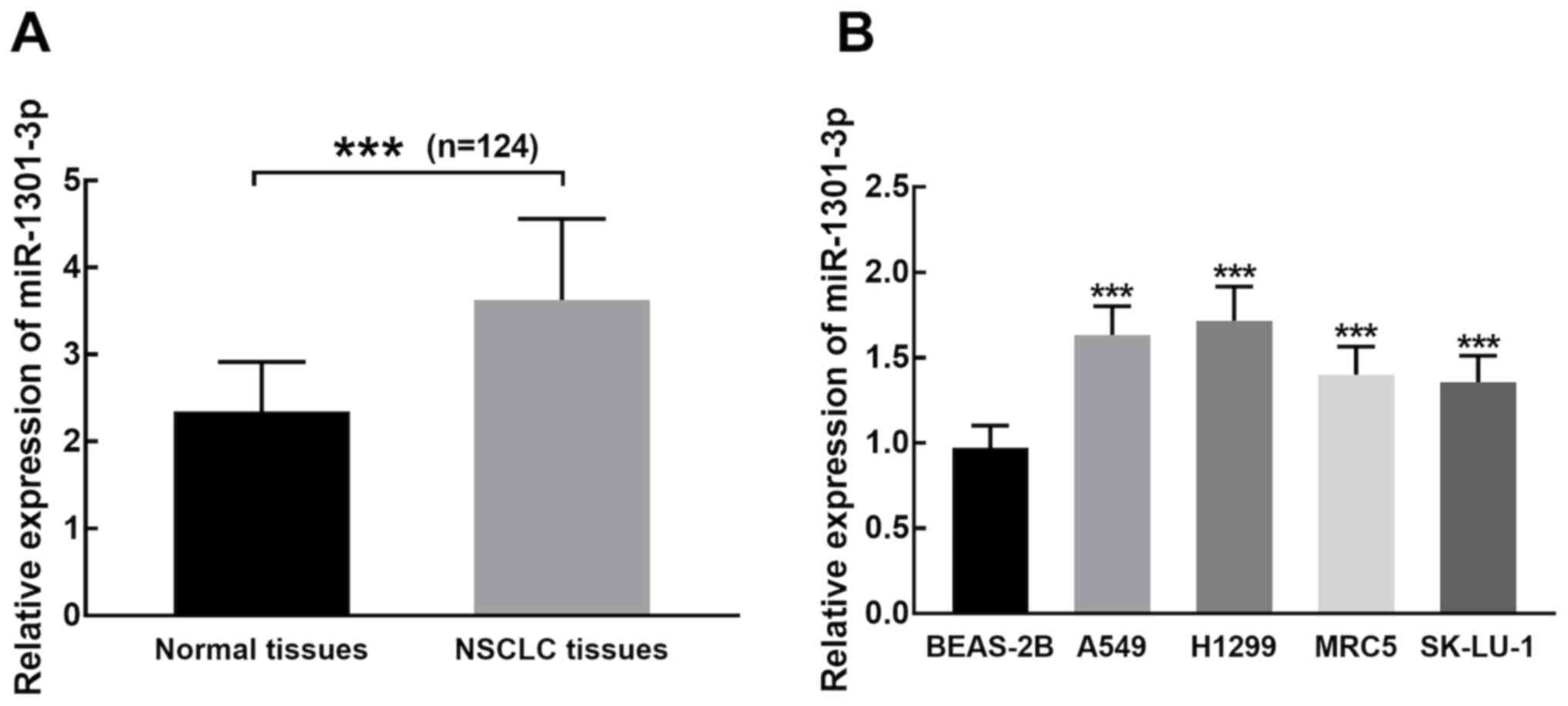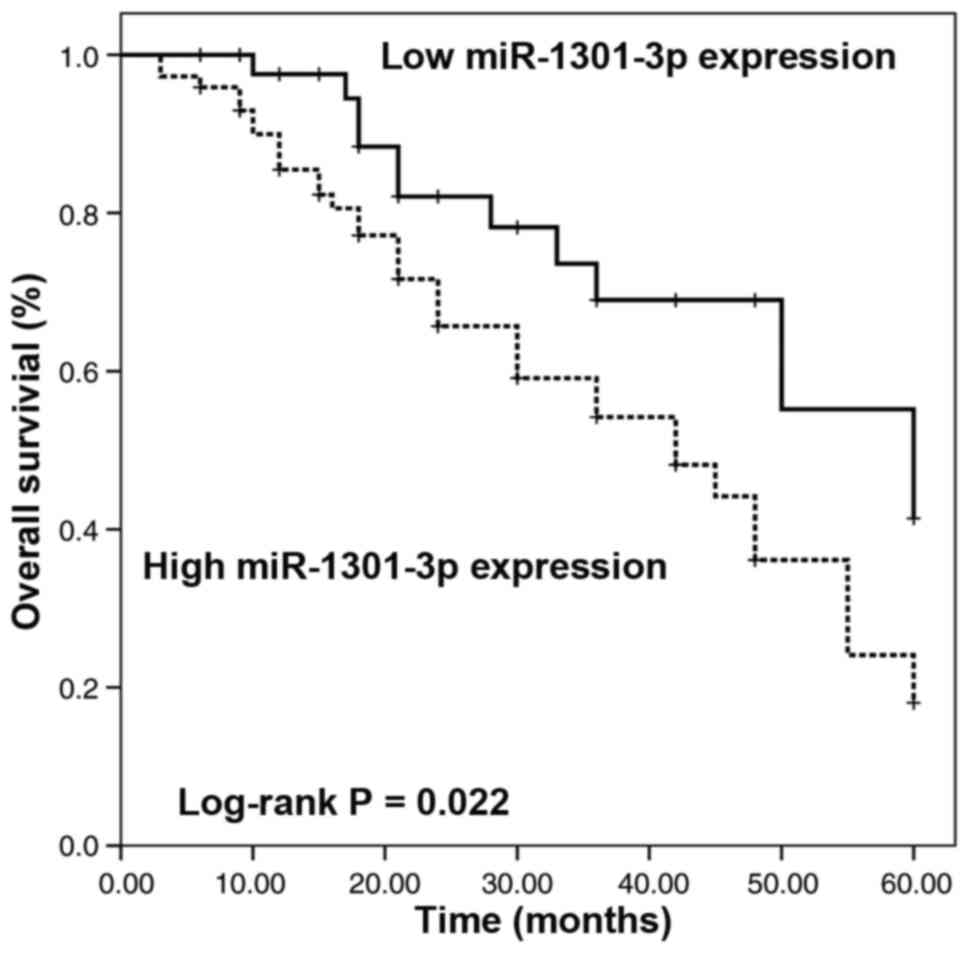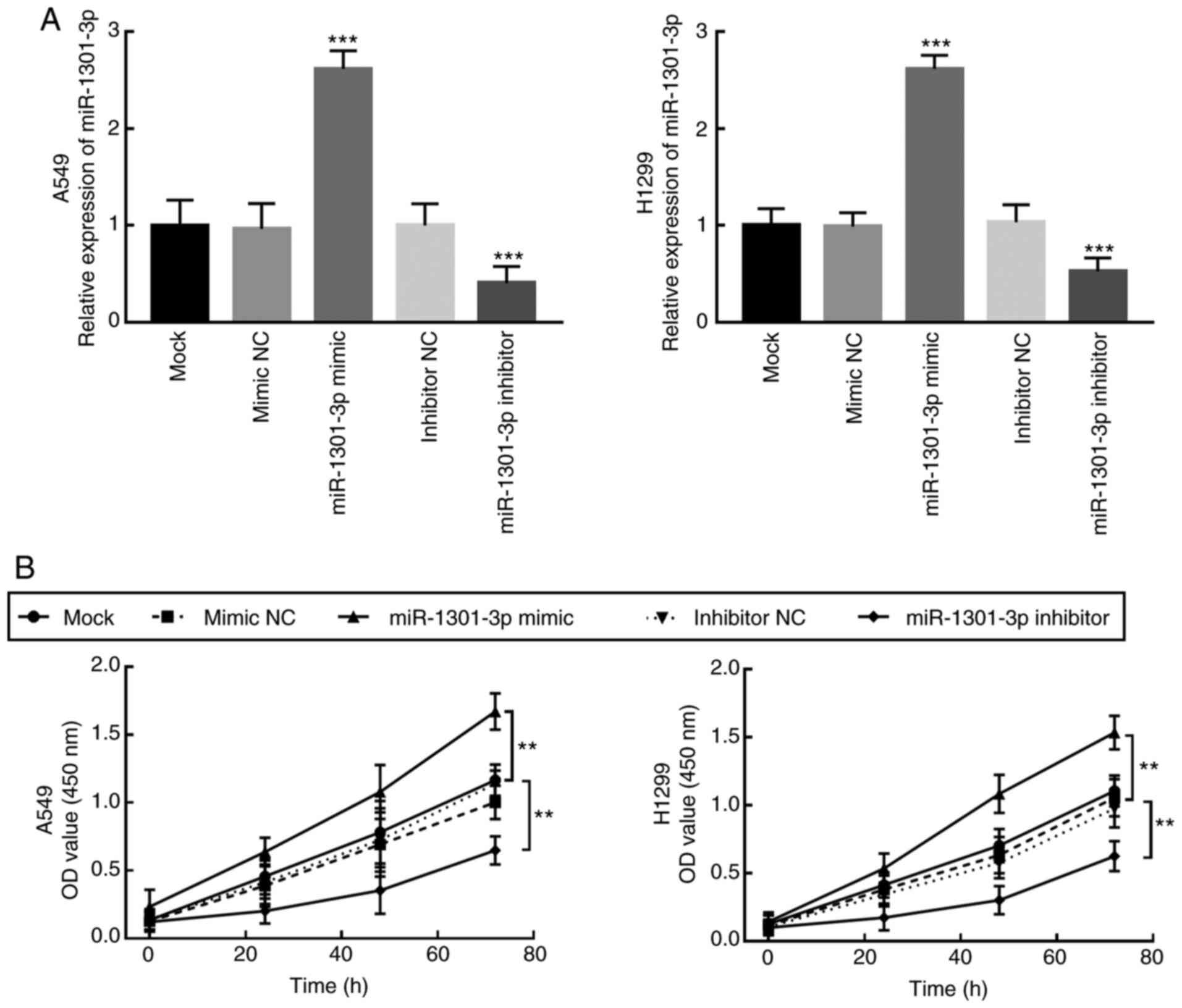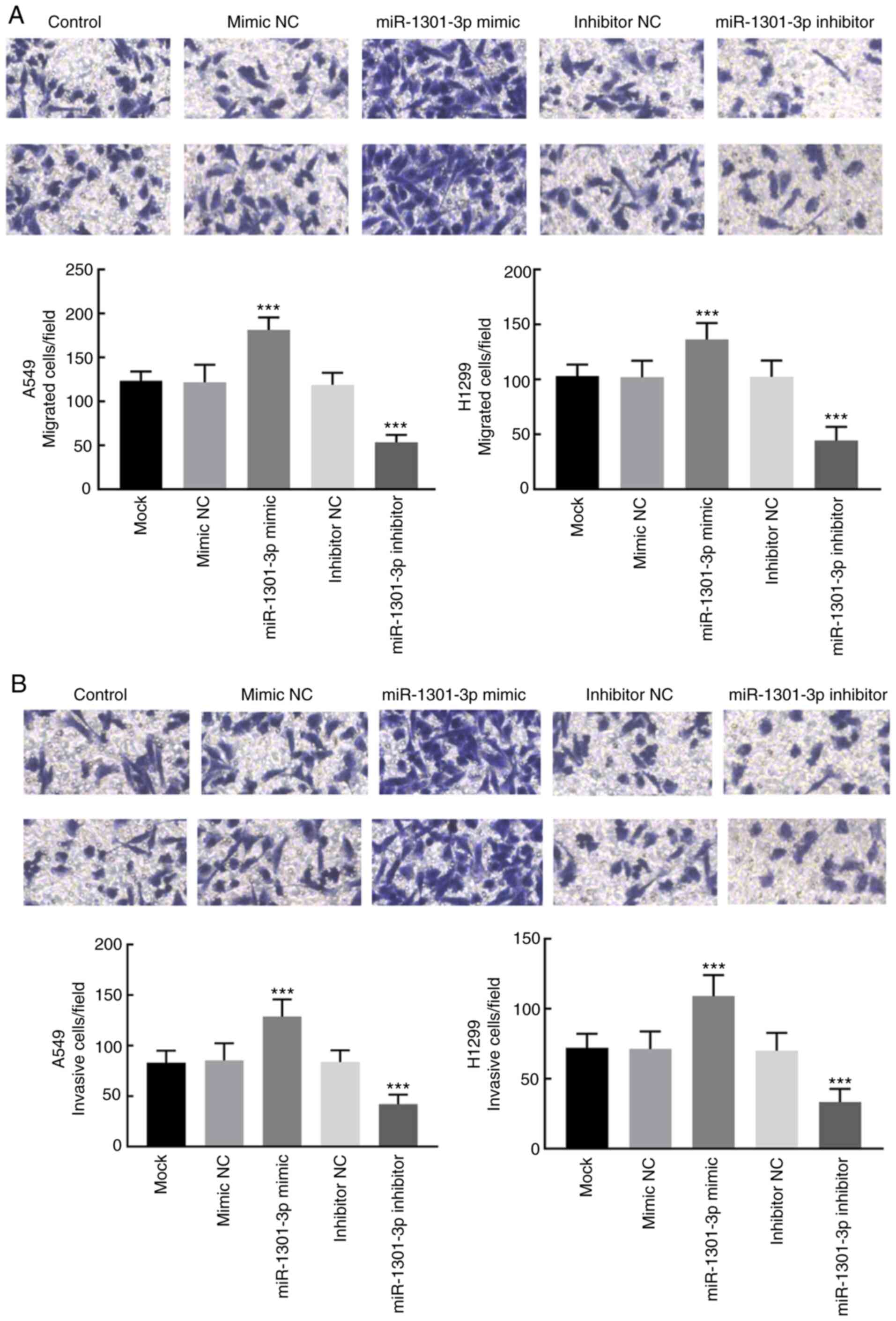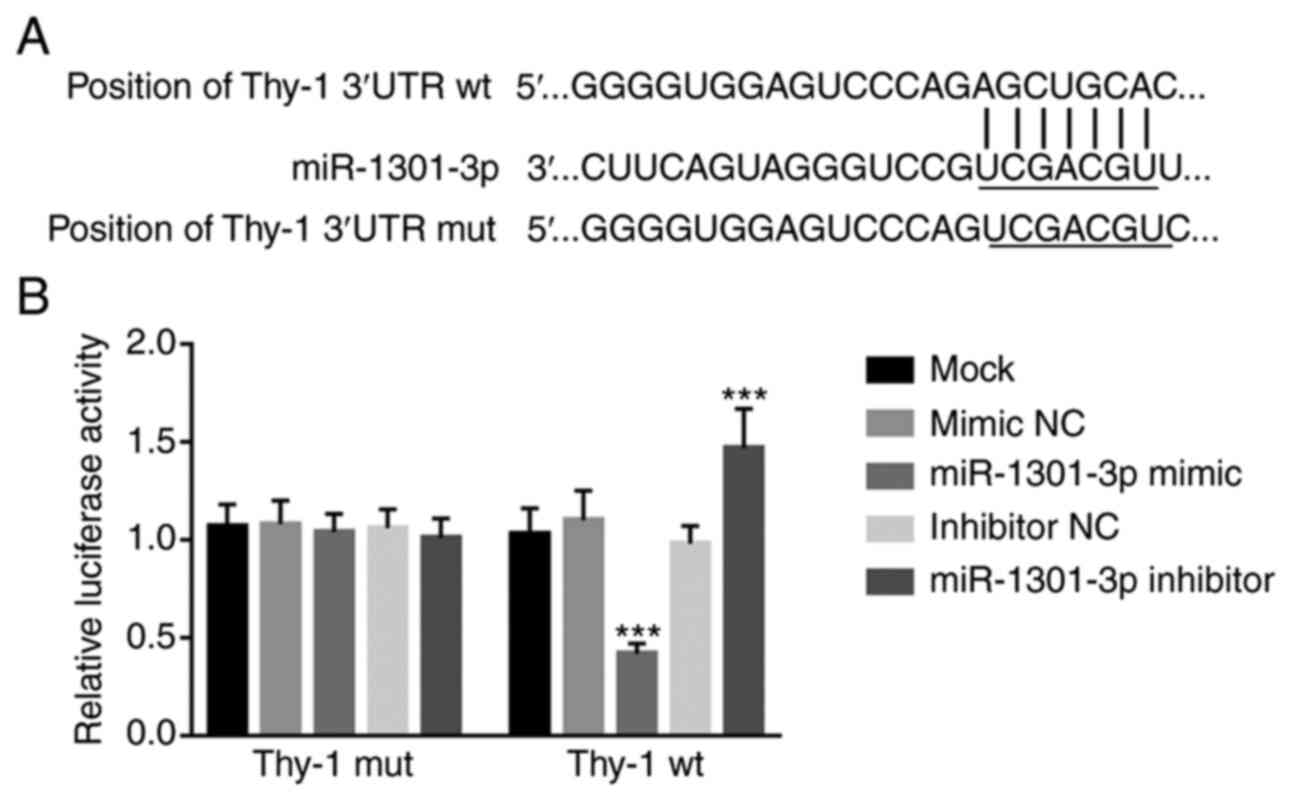|
1
|
Kumar M, Ernani V and Owonikoko TK:
Biomarkers and targeted systemic therapies in advanced non-small
cell lung cancer. Mol Aspects Med. 45:55–66. 2015. View Article : Google Scholar : PubMed/NCBI
|
|
2
|
Bray F, Ferlay J, Soerjomataram I, Siegel
RL, Torre LA and Jemal A: Global cancer statistics 2018: GLOBOCAN
estimates of incidence and mortality worldwide for 36 cancers in
185 countries. CA Cancer J Clin. 68:394–424. 2018. View Article : Google Scholar : PubMed/NCBI
|
|
3
|
Bilfinger T, Keresztes R, Albano D and
Nemesure B: Five-year survival among Stage IIIA lung cancer
patients receiving two different treatment modalities. Med Sci
Monit. 22:2589–2594. 2016. View Article : Google Scholar : PubMed/NCBI
|
|
4
|
Goldstraw P, Chansky K, Crowley J,
Rami-Porta R, Asamura H, Eberhardt WE, Nicholson AG, Groome P,
Mitchell A, Bolejack V, et al: The IASLC lung cancer staging
project: Proposals for revision of the TNM stage groupings in the
forthcoming (Eighth) edition of the TNM classification for lung
cancer. J Thorac Oncol. 11:39–51. 2016. View Article : Google Scholar : PubMed/NCBI
|
|
5
|
Marra A, Richardsen G, Wagner W,
Muller-Tidow C, Koch OM and Hillejan L: Prognostic factors of
resected node-positive lung cancer: Location, extent of nodal
metastases, and multimodal treatment. Thorac Surg Sci.
8:Doc012011.PubMed/NCBI
|
|
6
|
Ettinger DS, Wood DE, Aisner DL, Akerley
W, Bauman J, Chirieac LR, D'Amico TA, DeCamp MM, Dilling TJ,
Dobelbower M, et al: Non-small cell lung cancer, version 5.2017,
NCCN clinical practice guidelines in oncology. J Natl Compr Canc
Netw. 15:504–535. 2017. View Article : Google Scholar : PubMed/NCBI
|
|
7
|
Yu SL, Koo H, Lee SI, Kang J, Han YH, Yeom
YI and Lee DC: A synthetic CPP33-conjugated HOXA9 active domain
peptide inhibits invasion ability of non-small lung cancer cells.
Biomolecules. 10:15892020. View Article : Google Scholar
|
|
8
|
Mielgo-Rubio X, Calvo V, Luna J, Remon J,
Martín M, Berraondo P, Jarabo JR, Higuera O, Conde E, De Castro J,
et al: Immunotherapy moves to the early-stage setting in non-small
cell lung cancer: Emerging evidence and the role of biomarkers.
Cancers (Basel). 12:34592020. View Article : Google Scholar
|
|
9
|
Mustachio LM and Roszik J: Current
targeted therapies for the fight against non-small cell lung
cancer. Pharmaceuticals (Basel). 13:3742020. View Article : Google Scholar
|
|
10
|
Mohr AM and Mott JL: Overview of microRNA
biology. Semin Liver Dis. 35:3–11. 2015. View Article : Google Scholar : PubMed/NCBI
|
|
11
|
Lu TX and Rothenberg ME: MicroRNA. J
Allergy Clin Immunol. 141:1202–1207. 2018. View Article : Google Scholar : PubMed/NCBI
|
|
12
|
Rupaimoole R and Slack FJ: MicroRNA
therapeutics: Towards a new era for the management of cancer and
other diseases. Nat Rev Drug Discov. 16:203–222. 2017. View Article : Google Scholar : PubMed/NCBI
|
|
13
|
Romano G, Veneziano D, Acunzo M and Croce
CM: Small non-coding RNA and cancer. Carcinogenesis. 38:485–491.
2017. View Article : Google Scholar : PubMed/NCBI
|
|
14
|
Peng X, Yan B and Shen Y: MiR-1301-3p
inhibits human breast cancer cell proliferation by regulating cell
cycle progression and apoptosis through directly targeting ICT1.
Breast Cancer. 25:742–752. 2018. View Article : Google Scholar : PubMed/NCBI
|
|
15
|
Song XL, Huang B, Zhou BW, Wang C, Liao
ZW, Yu Y and Zhao SC: miR-1301-3p promotes prostate cancer stem
cell expansion by targeting SFRP1 and GSK3β. Biomed Pharmacother.
99:369–374. 2018. View Article : Google Scholar : PubMed/NCBI
|
|
16
|
Wang L, Zhao Y, Xu M, Zhou F and Yan J:
Serum miR-1301-3p, miR-335-5p, miR-28-5p, and their target B7-H3
may serve as novel biomarkers for colorectal cancer. J BUON.
24:1120–1127. 2019.PubMed/NCBI
|
|
17
|
Zhang YQ, Wang WY, Xue JX, Xu Y, Fan P,
Caughey BA, Tan WW, Cao GQ, Jiang LL, Lu Y, et al: MicroRNA
expression profile on solid subtype of invasive lung adenocarcinoma
reveals a panel of four miRNAs to Be associated with poor prognosis
in Chinese patients. J Cancer. 7:1610–1620. 2016. View Article : Google Scholar : PubMed/NCBI
|
|
18
|
Huston SF, Abdelmalik AG, Nguyen NC,
Farghaly HR and Osman MM: Whole-body 18F-FDG PET/CT: The need for a
standardized field of view-a referring-physician aid. J Nucl Med
Technol. 38:123–127. 2010. View Article : Google Scholar : PubMed/NCBI
|
|
19
|
Livak KJ and Schmittgen TD: Analysis of
relative gene expression data using real-time quantitative PCR and
the 2(-Delta Delta C(T)) method. Methods. 25:402–408. 2001.
View Article : Google Scholar : PubMed/NCBI
|
|
20
|
Pao W and Chmielecki J: Rational,
biologically based treatment of EGFR-mutant non-small-cell lung
cancer. Nat Rev Cancer. 10:760–774. 2010. View Article : Google Scholar : PubMed/NCBI
|
|
21
|
Ahn YH and Ko YH: Diagnostic and
therapeutic implications of microRNAs in non-small cell lung
cancer. Int J Mol Sci. 21:87822020. View Article : Google Scholar
|
|
22
|
El Aamri M, Yammouri G, Mohammadi H, Amine
A and Korri-Youssoufi H: Electrochemical biosensors for detection
of MicroRNA as a cancer biomarker: Pros and Cons. Biosensors.
10:1862020. View Article : Google Scholar
|
|
23
|
Ortiz-Quintero B: Extracellular MicroRNAs
as intercellular mediators and noninvasive biomarkers of cancer.
Cancers (Basel). 12:34552020. View Article : Google Scholar
|
|
24
|
Wang J, Liu L, Sun Y, Xue Y, Qu J, Pan S,
Li H, Qu H, Wang J and Zhang J: miR-615-3p promotes proliferation
and migration and inhibits apoptosis through its potential target
CELF2 in gastric cancer. Biomed Pharmacother. 101:406–413. 2018.
View Article : Google Scholar : PubMed/NCBI
|
|
25
|
Cui HW, Han WY, Hou LN, Yang L, Li X and
Su XL: miR-1915-3p inhibits Bcl-2 expression in the development of
gastric cancer. Biosci Rep. 39:BSR201823212019. View Article : Google Scholar : PubMed/NCBI
|
|
26
|
Wei Y, Wang Y, Zang A, Wang Z, Fang G and
Hong D: miR-4766-5p inhibits the development and progression of
gastric cancer by targeting NKAP. Onco Targets Ther. 12:8525–8536.
2019. View Article : Google Scholar : PubMed/NCBI
|
|
27
|
Wei CH, Wu G, Cai Q, Gao XC, Tong F, Zhou
R, Zhang RG, Dong JH, Hu Y and Dong XR: MicroRNA-330-3p promotes
cell invasion and metastasis in non-small cell lung cancer through
GRIA3 by activating MAPK/ERK signaling pathway. J Hematol Oncol.
10:1252017. View Article : Google Scholar : PubMed/NCBI
|
|
28
|
Jia Y, Tan W and Zhou Y: Transfer
RNA-derived small RNAs: Potential applications as novel biomarkers
for disease diagnosis and prognosis. Ann Transl Med. 8:10922020.
View Article : Google Scholar : PubMed/NCBI
|
|
29
|
Parizi PK, Yarahmadi F, Tabar HM, Hosseini
Z, Sarli A, Kia N, Tafazoli A and Esmaeili SA: MicroRNAs and target
molecules in bladder cancer. Med Oncol. 37:1182020. View Article : Google Scholar : PubMed/NCBI
|
|
30
|
Li K, Xu Y and Yuan LN: Down-regulation of
miR-5702 is associated with clinical progression and poor prognosis
in patients with non-small-cell lung cancer. Eur Rev Med Pharmacol
Sci. 23:2047–2052. 2019.PubMed/NCBI
|
|
31
|
Wang N and Liu W: Increased expression of
miR-552 acts as a potential predictor biomarker for poor prognosis
of colorectal cancer. Eur Rev Med Pharmacol Sci. 22:412–416.
2018.PubMed/NCBI
|
|
32
|
Wen J, Wang H, Dong T, Gan P, Fang H, Wu
S, Li J, Zhang Y, Du R and Zhu Q: STAT3-induced upregulation of
lncRNA ABHD11-AS1 promotes tumour progression in papillary thyroid
carcinoma by regulating miR-1301-3p/STAT3 axis and PI3K/AKT
signalling pathway. Cell Prolif. 52:e125692019. View Article : Google Scholar : PubMed/NCBI
|
|
33
|
Xu G, Wang H, Yuan D, Yao J, Meng L, Li K,
Zhang Y, Dang C and Zhu K: RUNX1-activated upregulation of lncRNA
RNCR3 promotes cell proliferation, invasion, and suppresses
apoptosis in colorectal cancer via miR-1301-3p/AKT1 axis in vitro
and in vivo. Clin Transl Oncol. 22:1762–1777. 2020. View Article : Google Scholar : PubMed/NCBI
|
|
34
|
Rege TA and Hagood JS: Thy-1 as a
regulator of cell-cell and cell-matrix interactions in axon
regeneration, apoptosis, adhesion, migration, cancer, and fibrosis.
FASEB J. 20:1045–1054. 2006. View Article : Google Scholar : PubMed/NCBI
|
|
35
|
Shentu TP, Huang TS, Cernelc-Kohan M, Chan
J, Wong SS, Espinoza CR, Tan C, Gramaglia I, van der Heyde H, Chien
S and Hagood JS: Thy-1 dependent uptake of mesenchymal stem
cell-derived extracellular vesicles blocks myofibroblastic
differentiation. Sci Rep. 7:180522017. View Article : Google Scholar : PubMed/NCBI
|
|
36
|
Schliekelman MJ, Creighton CJ, Baird BN,
Chen Y, Banerjee P, Bota-Rabassedas N, Ahn YH, Roybal JD, Chen F,
Zhang Y, et al: Thy-1+ Cancer-associated fibroblasts
adversely impact lung cancer prognosis. Sci Rep. 7:64782017.
View Article : Google Scholar : PubMed/NCBI
|
|
37
|
Schubert K, Gutknecht D, Koberle M,
Anderegg U and Saalbach A: Melanoma cells use Thy-1 (CD90) on
endothelial cells for metastasis formation. Am J Pathol.
182:266–276. 2013. View Article : Google Scholar : PubMed/NCBI
|
|
38
|
Hsu HH, Ko KH, Chou YC, Lin LF, Tsai WC,
Lee SC, Chang H and Huang TW: SUVmax and tumor size predict
surgical outcome of synchronous multiple primary lung cancers.
Medicine (Baltimore). 95:e23512016. View Article : Google Scholar : PubMed/NCBI
|
|
39
|
Petrovic M, Baskic D, Bankovic D and Ilic
N: Neuroendocrine differentiation as an indicator of
chemosensitivity and prognosis in nonsmall cell lung cancer.
Biomarkers. 16:311–320. 2011. View Article : Google Scholar : PubMed/NCBI
|
|
40
|
Fukui M, Suzuki K, Matsunaga T, Oh S and
Takamochi K: Importance of smoking cessation on surgical outcome in
primary lung cancer. Ann Thorac Surg. 107:1005–1009. 2019.
View Article : Google Scholar : PubMed/NCBI
|















